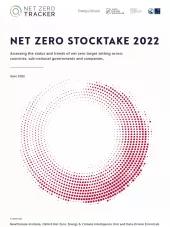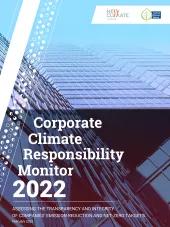NewClimate Institute led the analyses of Chapter 5.3 of the ‘Navigating Energy Transitions: Mapping the road to 1.5°C’ report: The chapter summarises findings of recently published literature and analyses on corporate net-zero targets.
See the full recording of the report’s lunch webinar on the 24th of October including NewClimate staff member Frederic Hans here online.
Corporate net-zero targets: An inadequate state of play entering a crucial decade
Existing corporate net-zero targets typically suffer from a lack of ambition and have other severe shortcomings. An emerging body of literature assessing a range of different company samples emphasises four common shortcomings in corporate net-zero target setting:
- Incomplete emissions disclosure and emissions coverage across all scopes.
- Inadequate specification of own emission reductions alongside net-zero pledges.
- Insufficient implementation of key emission reduction measures.
- Reliance on contentious offsetting practices to meet net-zero pledges.
These findings indicate that corporates tend to use their net-zero targets as vehicles for vague and non-committal long-term climate intentions, or even greenwashing. The few ambitious companies that put forward credible net-zero targets struggle to differentiate themselves from the majority of corporates taking limited action while announcing untransparent and unsubstantiated net-zero pledges.
The risk of misleading promises in net-zero targets in the oil and gas sector
Net-zero targets in the oil and gas sector particularly are oftentimes unsubstantiated promises with a high potential to mislead consumers, investors, and regulators. Net-zero targets of oil and gas companies predominantly focus on decarbonising the production of fossil fuels, thus neglecting their actual use by end consumers and associated emissions that constitute the vast amount of emissions across their value chain. Net-zero pledges that exclude emissions at the core of fossil fuels companies’ business case may give external stakeholders an inaccurate and unjustified impression on the prospects for decarbonising this emission-intensive industry.
This misleading practice can directly lead to continued investments in energy infrastructure not compatible with the Paris Agreement. Unsubstantiated net-zero targets hold the potential to nullify drivers of climate action, for example, as regulators would be more active in introducing regulation that leads to corporate decarbonisation, and shareholders would be more active in requiring companies to decarbonise, without them.
Urgent need for regulative intervention
Regulative approaches by governments at global and national levels hold an enormous potential to ensure highly ambitious corporate long-term targets. Such regulation could provide robustly defined concepts that add substantive criteria to ensure Paris Agreement compatibility, and mandate comprehensive and third-party verified disclosure practices.









